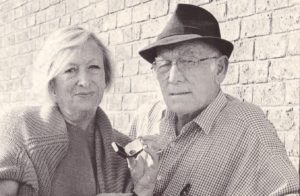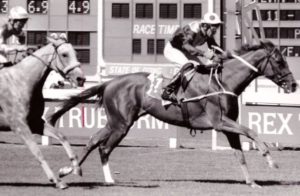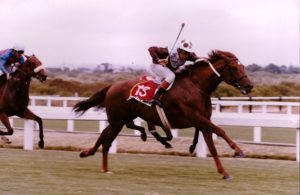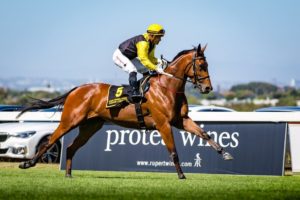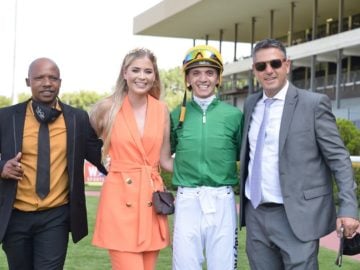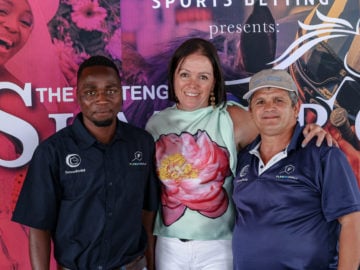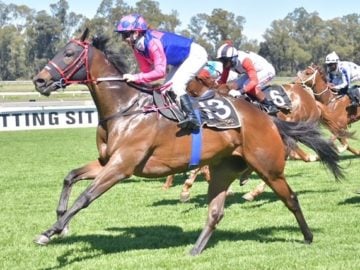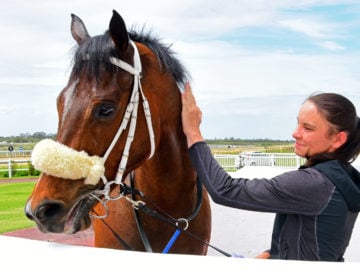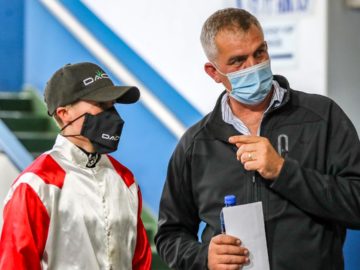Alec Laird was born on 13 July 1960, a year before the first of his father – the great Syd Laird’s – seven wins in the Durban July. Alec jokes that he’s either known as ‘Syd’s son’ or London News’ trainer, but as Smart Call’s win in the Paddock Stakes proves, there’s a great deal more to him than that.
While he has been in the business most of his life, and very successfully too, it seems Alec has never got comfortable with the limelight and it comes as a shock to realise that he is in fact quite shy. Life is full of surprises!
Rather than trading on the family legacy, Alec prefers to go quietly about his business and let his horses do the talking for him. When he does speak, his voice is gruff, but the words are surprisingly gentle. Below the serious reputation lies a lively intellect and an equally lively sense of humour and his stories are peppered with funny anecdotes and fascinating behind the scenes detail.
About Alec
He shows me into Smart Call’s box while he fills me in on a bit of family history. Alec was born in Cape Town, the oldest of Syd and Marlene Laird’s three children, and spent his formative years at the famous, but sadly now long gone, Roamer Lodge. Asked whether he remembers much about the old place he says with a grin, “I remember the sand!”
The family moved to Durban during the Sea Cottage years, and Alec did most of his schooling in KZN, before heading off for 2 years to complete his national service, where his surname got him in trouble with his commanding officer. Assuming Alec was related to the owners of tack shop Laird Leatherware, he was not happy to learn that Alec was in fact unable to get him a good price on a saddle. Alec worked as a farrier, joking that he made his mistakes on the army horses, but is proud of the fact that he can put a shoe on a horse.
Syd tried hard to discourage him from becoming a trainer. “His uncle (Syd Garrett) also insisted on him learning a trade, so he became a fitter and turner on the railways. That’s how he lost the tip of one of his fingers – in one of the old locomotives.” Alec did attend three months of university, but says his interest waned when the first set of exams rolled round and he headed to Joburg to join his father as an assistant at his Alberton base.
“By then he’d had most of his big horses, but they were exciting times and we had some good horses. It was tough setting up in Joburg, but we got it right. I was keen to go overseas to learn about training, but my dad said ‘What can they teach you that I can’t?’ I suppose he had a point,” Alec says drily. “I learnt by watching. He said ‘keep your eyes and ears open and your mouth shut and he gave me three years to be a sponge. He was spot on, almost to the day. After that, I started having my own opinions and in that way it wasn’t easy. He didn’t enjoy other ideas too much.”
Stretching his wings
“My best times were when he was away raiding Cape Town or Durban, because that’s when I got to try out my own ideas and that’s when I learnt the most. The first time he went away, I overworked the horses. We discussed it when he got back and I realised he was right. The second time, I underworked them. Eventually I got it right. There were no cell phones in those days, so while he was away, I had to wait till the end of the day to phone and say how things went. I loved phoning him when we’d had a winner.” He rubs his wrists thoughtfully.
Syd was in Cape Town for the 1988 Guineas with a filly called Mill Hill, when he died of a heart attack. “He insisted on going to Cape Town on his own – he had no assistant and was doing it all himself. He had a heart attack and dropped dead in Barn 6 on the 8th of February. I had to go down and sort everything out. Mill Hill was scheduled to run in the Rex Trueform at Kenilworth – it’s an 1800m race that isn’t on the programme anymore. She ran and she won and that was the first winner in my name. That was on the 20th of February. The owners were wonderful – they simply made out the cheques to me and that was it.”
Mill Hill won again in the Lancome Fillies Handicap and gave him his first Gr1 in his first year of training. “I think it helped,” he says modestly. “It helped kick me off. When I took over the string, we had 60 boxes. There was no money in the bank, but no debt. I was 28 – almost ready. At that age, you’re bullet proof of course, but part of being a trainer is that you have to believe in yourself. You make mistakes – you think you need to be hard on them, then you feel sorry for them and you’re too soft – you’ve got to find the balance. When you’re winning, you know you’ve got it. Like my dad said, in this game, you’re always learning and whether it’s someone at the bottom of the ladder or the top, everyone has something to teach you.”
After training from Alberton, Alec moved to Randjesfontein about 20 years ago and currently has a string of about 100 horses. “I think I’ve got some nice 2yo’s coming through this year,” he predicts.
Picking horses
He was lucky enough to inherit some big name clients and Alec is quick to acknowledge that the Becks and Jaffees were very supportive. “They gave me horses, but had lots of other trainers to feed,” he points out, “so I’d only get 1 or 2 a year. I have a system of picking yearlings. I grade them either 1, 2 or 3. A 1 star is ok, and should win a race, 2 is a decent horse. Threes are very rare. Talk about luck. I rated Crimson Waves about a 1 and he was a R30k buy that Beck bought back. Turned out to be the best horse I’ve ever had. Unfortunately he broke down, which was partly the farrier and partly my fault. I’d brought three horses to Cape Town for the Met in 1993. Queen’s Gold got biliary and never ran, but I decided to give him a run in the Merchants. Crimson Waves had been showing me something at work, but he’d overreached and missed 10 days of training. It was our last meeting before going home, so I decided to get a run under his belt. Martin Uys sprinted him up on the Saturday and he pulled up blowing hard. I didn’t know whether I was doing the right thing, but we ran him on the Wednesday and he won easily and of course couldn’t blow out a candle. I was so excited – I said right then and there I was going to win the Guineas. Back home, Toby van Booma rode him in a 1200m Juvenile Plate – he took a hold and still won by 6 lengths. He missed the Nursery because he was shin sore, was a bit underdone for the Smirnoff and got beaten into 4th. He had terribly boxy feet and just before the Administrators, we had a new farrier who changed the hoof angles entirely. Crimson Waves came down in the Administrators and with that and the different farriery he chipped both fetlocks. He recovered and he won again, but he was never the same,” he says ruefully.
Sacred Jungle was another Beck buy, although Alec says he had very little to do with the purchase. “Beck just passed me at the sales, stuck the slip into my pocket, wagged a finger at me and said ‘Don’t f it up!’”
London News had received a 2 star rating on Alec’s shortlist. “He was a nice horse, but the Jaffee’s wanted a Bush Telegraph. There were a few on the list and London News was right at the end of day 3. As the sale wore on and the others were sold, he got nicer and nicer,” he quips. When did he know he was a champion? “When you pick them at the sales, you already have an idea, but it was probably when he won the Dingaans – you don’t win the Dingaans with a bad horse.” The London News story is a well-worn one by now, but asked how he coped with all the furore and the hoopla of the international campaign he just shrugs. “He was an easy horse to train. And you just take it one day at a time.”
As we chat, big names trip off his tongue easily and after nearly 3 decades in the game, there are reels of them. Looking at his raiding string, one picks up a trend and Alec concedes that he likes a Classic type. However, despite the reputation he doesn’t always go to the sale with a big budget and likes to look for value. “If Legislate was bought for R100k, then there’s no excuse. I like to think I can pick a horse, but if I could guarantee it, I wouldn’t need any owners,” he says philosophically. Bezanova is a case in point and he has a good strike rate producing Gr1’s with first season sires, including Greys Inn, Judpot and now Ideal World.
Smart filly
While we’re talking, Smart Call moves around her box, allowing a good chance to appraise her thoroughly. She has a long, delicate face, with almost comically large ears. She has a good length of rein with a deep girth and strong loin and the sort of conformation that would have the old English painters in raptures. She also has a very good temperament and as she moves around the box, finding things to pick at, she frequently stops to nuzzle her trainer, or simply to stand quietly next to him and breathe on his shoulder. “It’s a sign of good breeding,” Alec says, giving her an appreciative stroke. “The top European studs start with good temperaments.”
It seems the international escapades with London News may stand him in good stead as the Paddock Stakes qualifies for the same ‘win and you’re in’ scheme as the Queen’s Plate and they may well be off to the Breeders’ Cup. “It’s a pipe dream perhaps, but Jessica (Slack) is keen, so why not?”
“She’s pulled up well, she’s trotting sound, she’s happy. We’ll have to get her out sooner rather than later, so that we have time to prep over there, but we’ll give her one more run. The Majorca is a lovely race to go for, but it would be coming back in distance and I think she’s better over 1800-2000, maybe even 2400m, so we’ll take our chances in the Met. It’s a top race and we’ll be taking on the boys, so she’ll need to find a few lengths, but that’s the route we’re going. We’ll have a crack at the Met and then look at which avenue to go, but we’ve got a ticket to the Breeders’ Cup and as long as Jess is keen it will be a great experience. But we came for the Paddock, so for the time being, it’s Mission Accomplished.”
‹ Previous




